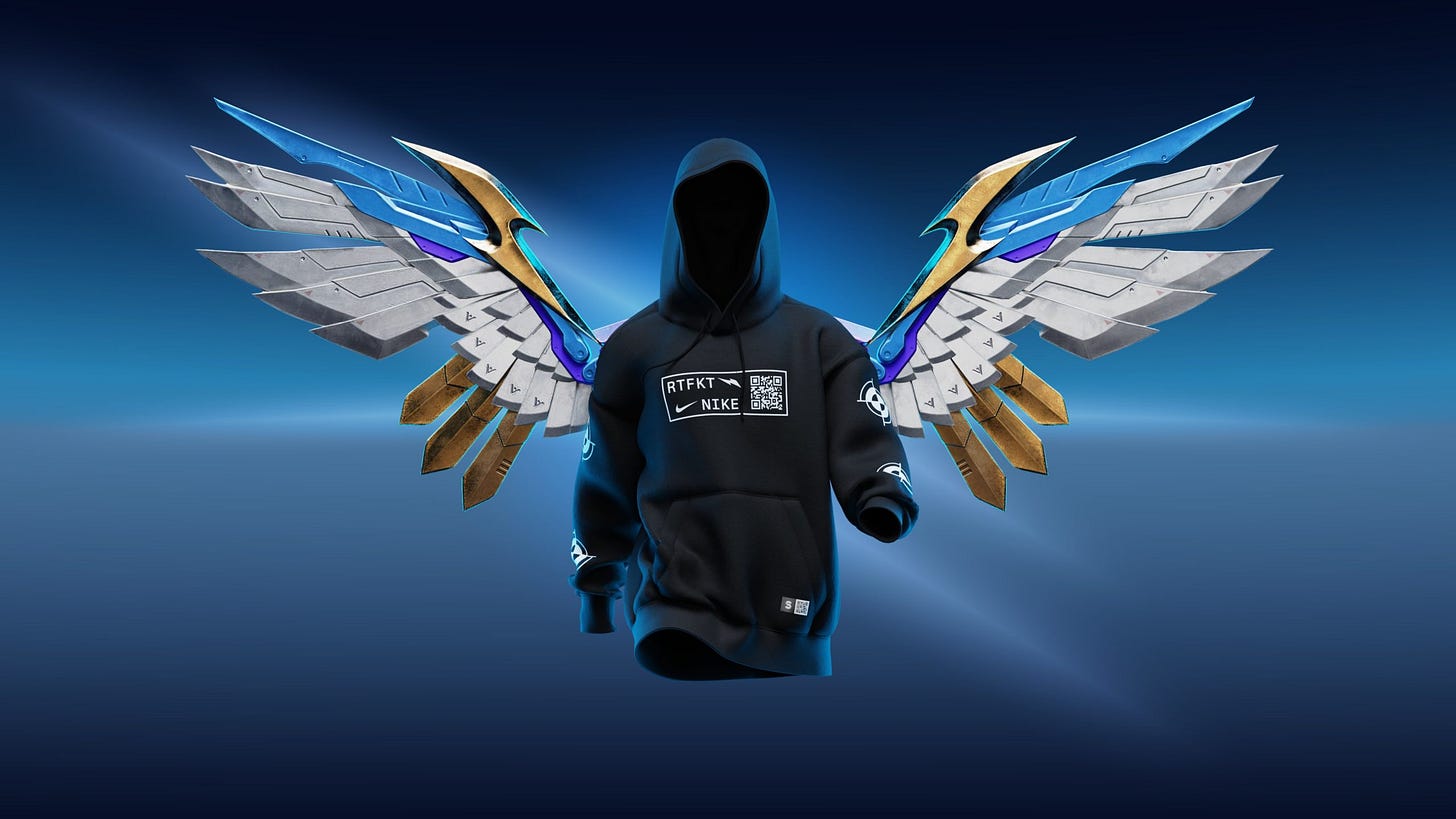1. RTFKT x Nike Unveils a Way to Flaunt Digital Drip IRL
The year is 2004, and you’re getting ready for day 1 of Middle School. Everyone remembers the stress that comes with that day. You wanted to look your best and make a good impression. That’s why you went with a Led Zeppelin hoodie.
A classic… can’t miss.
The year is 2032, and you’re getting your 6th grader ready for day 1 Middle School. The Led Zeppelin hoodie isn’t going to cut it. Your 6th grader dons the NFT-powered hoodie that lets anyone with an AR set (i.e. everyone) see the wings of his favorite gaming avatar sprout out of his back. Times have changed.
RTFKT is working on this reality. Their latest digital/physical product, the Nike Genesis hoodie includes an NFC (near field communication) chip that can be tracked by AR devices, allowing them to see your virtual wings.
And on the ‘blank check’ Nike wrote them… RTFKT co-founder, Steven Vasilev says, "With Nike, RTFKT is laying the groundwork of what a digital fashion play looks like when backed by a major heritage (meaning Web2) brand… (We are) conscious of staying true to the fast-moving, quirky ethos that attracted its fiercely loyal community in the first place.” And Nike is giving them signoff to do just that.
Ultimately, this specific play is a bet on AR tech going mainstream. A normal person won’t pay $250 for a hoodie with digital wings if they can’t show them off.
But imagine walking through a crowded hallway, AR glasses on. This below scene will look a little different in a decade:
2. Visual Search: A New Threshold to the Internet?
In 2012, a lawsuit was filed against Google to cancel it’s trademark. The claim argued that the term ‘google’ had become synonymous with the act of ‘searching the internet’. The legal term, ‘genericide’ refers to when a trademark stops identifying the origin of products and starts becoming a general term. Similar to how ‘jumping on Zoom’ can refer to Meets, WebEx, or Teams (🤮).
But could “Google it” be on its way out of the world lexicon? Recently, SVP Prabhakar Raghavan of Google’s Knowledge & Information org suggested as much. Increasingly, younger generations are finding answers to their “Google It'“ questions on Instagram and TikTok. The visual nature of the platforms are much better for travel/food/ lifestyle recommendations.
And while, understanding keywords and how to efficiently land on the right webpage is half the job for any consultant… younger generations don’t seem to even think in ‘keywords’ anymore.
The internet is changing and the competition to deliver answers is getting steeper, whether an explicit question was asked or not. In fact, companies like Pinterest are working on how to proactively ask you questions first.
Naveen Gavini, SVP of Product at Pinterest, thinks it should be a collaborative process compares to getting a haircut from the same barber for decades.
“I don’t need to tell him when I walk in how I want my haircut because he knows me. But it started with that first conversation: It was an explicit conversation, like, ‘Hey, so how do you generally like your hair cut?’”
Pinterest is working on how best to ask those explicit questions so they can deliver better answers without you having to ask. They key is to do it transparently and making clear why the user will benefit from answering. No one wants to feel like they are being spied on.
Don’t count Google out though. AI is being integrated into search to analyze video content (including TikTok and Instagram). It can even direct you to a specific timestamp in a video. Still, TikTok may have you covered, even on the highway. ⬇️
3. Soundcloud Introduces “Fan-Powered Royalties”
Soundcloud has been a longtime supporter of independent artists and helped propel more than one to stardom (Post Malone for one). Last year, they introduced a ‘artist friendly’ revenue model that transparently pays out artists based on the % of time any given listeners dedicates to their music.
The model has proven better than Spotify’s ‘pro-rata’ model in paying artists for their success.
In one of the first studies of FPR in action, entertainment research firm MIDiA analyzed FPR data from 118,000 SoundCloud musicians, finding that 56% of artists earned more under FPR than pro-rata models; but those who earned less under FPR were often larger artists with over 100,000 listeners.
And adding more music to the FPR ecosystem could see it become more mainstream, giving budding artists more leverage in negotiating with labels.
Seems to be a trend… More to come!
…And In Case You Missed It
TBT runs NFT Commercials on ESPN: Catblox and Gutter Cat Gang
Duolingo introduces Valyrian language mod for GOT… Wen Elvish?
Kate Bush has made $3.75 million or so since Stranger Things used Running up That Hill in Season 4
And DALL-E is used to Visualize Untranslatable Words in NFT Art Project





